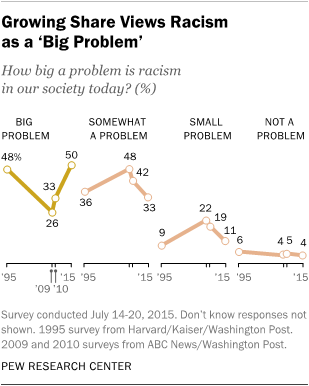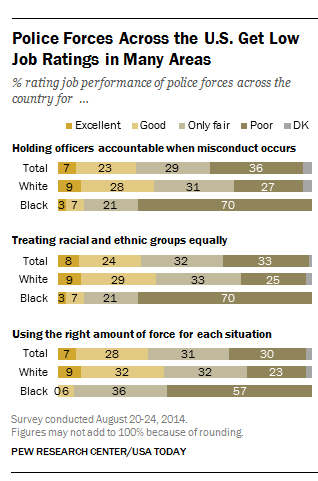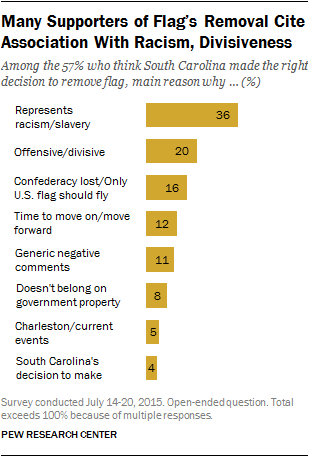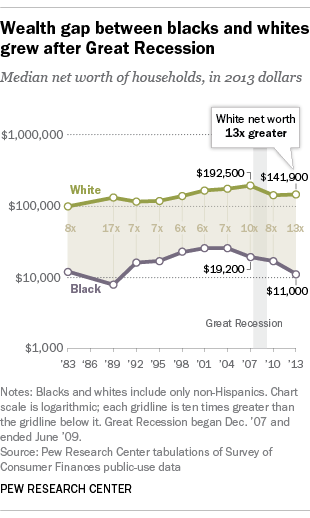Ever since it was first observed as a national holiday in 1986, Martin Luther King Jr. Day has been a time for reflection on the state of race relations in the U.S. and how much progress has been made – or not – in achieving racial equality.
Pew Research Center has tracked this subject over time. Here are five of our key findings:
About six-in-ten Americans say the country needs to continue making changes to assure that blacks have equal rights with whites, according to our July 2015 poll. This marks a substantial increase from 2014, when public opinion was much more closely divided. Underlying that majority is a significant racial divide: 86% of blacks say more needs to be done to achieve racial equality, compared with 53% of whites. However, the share of whites who see the need for change significantly increased from 39% a year earlier.


A growing share of Americans say that racism in society is a big problem. Half of Americans now say this, up from 33% five years earlier, reflecting an increase across all demographic groups. Nearly three-quarters of blacks characterized racism as a big problem, as did 58% of Hispanics. Although whites were far less likely to say racism is a big problem (44%), the share of whites expressing this view has risen 17 percentage points since 2010. There is a partisan divide too: 61% of Democrats say racism is a big problem, compared with 41% of Republicans – though the share of Republicans saying racism is a big problem has doubled since 2010, when it was just 17%.

Even before a series of police shootings of blacks last year, most Americans gave police departments around the country relatively low marks in treating races equally. In a survey conducted shortly after the August 2014 shooting of Michael Brown in Ferguson, Mo., about one-third or less of Americans thought police departments nationwide did a good or excellent job of holding officers accountable for misconduct, using the appropriate amount of force and treating racial and ethnic groups equally. Blacks were even less likely to hold positive views of police: Just 10% said police departments did a good or excellent job holding officers responsible for misconduct and treating racial and ethnic groups equally, and only 6% said police used the right amount of force for each situation. About four-in-ten whites gave positive marks to police nationally on these measures. Most of those surveyed expressed at least a modest amount of confidence in their local police departments.

Americans largely supported South Carolina’s removal of the Confederate battle flag from state grounds, a decision that was accelerated after the killing of nine black churchgoers in Charleston. About six-in-ten (57%) said taking down the flag was the right decision. The reason most cited by those who supported removal of the Confederate flag was that it represented racism and slavery. About three-quarters (76%) of blacks along with a narrower majority of whites (56%) backed the decision. Blacks were more likely than either whites or Hispanics to say they experienced a negative reaction when they see the flag: 42% of African Americans reported experiencing a negative reaction, compared with 27% of whites and 24% of Hispanics.

The wealth gap between blacks and whites in 2013 reached its highest point since 1989. The wealth of white households was 13 times the median wealth of black households in 2013, according to a Pew Research Center analysis of the most recently available data from the Federal Reserve’s Survey of Consumer Finances. In 2010, whites had eight times the wealth of blacks. This growing racial inequality suggests that the economic recovery since the Great Recession has not benefitted all households alike. In fact, our analysis revealed a stark divide in the experiences of white and black households during the economic recovery. From 2010 to 2013, the median wealth of white households increased by 2.4%, while the median wealth of black households fell by a third.